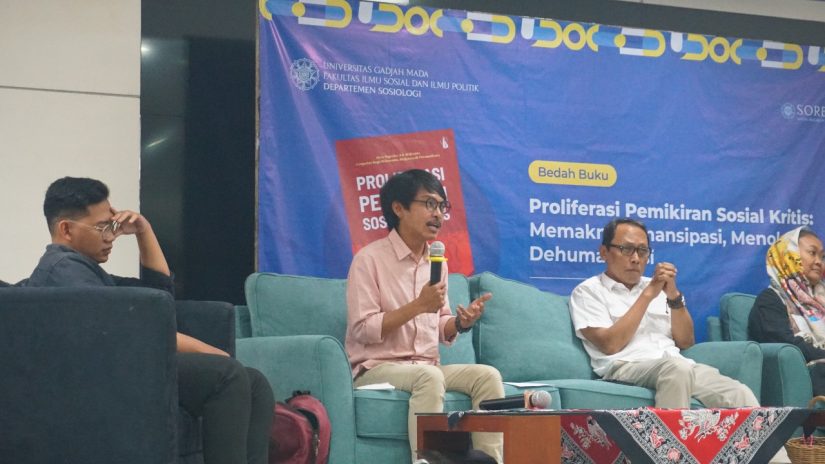
Yogyakarta, March 21st 2024—Technological development and progress is something that cannot be avoided. On the one hand, sophisticated and modern technology provides various conveniences in all aspects of human life. But on the other hand, the resulting gap causes the phenomenon of “dehumanization”. This opinion is stated in the book “Proliferation of Critical Social Thought: Understanding Emancipation, Rejecting Dehumanization” which was thoroughly discussed in the book review of the Department of Sociology on Thursday (21/3).
This book was written directly by Prof. Dr. Heru Nugroho, a Professor of the Department of Sociology UGM. “My background in writing this book started with my commitment. Previously, the Department of Sociology was starting to get old, so regeneration intrigued me. I don’t think it’s enough to just teach, but we can regenerate in other ways. I don’t want this knowledge to stick to myself, so I want others to be labeled critical too,” explained Prof. Heru. With the help of the Vice Chancellor of UGM, Dr. Arie Sujito, S.Sos., M.Sc. This book comes as a continuation of another critical book by Prof. Heru.
Critical social thinking in this book criticizes how digital developments and practices as well as liberal political-economic transformation have an impact on the loss of citizens’ rights. Through a critical sociological perspective, the arguments in the book attempt to elaborate on the gaps and negative effects of neoliberal change. The emergence of workers’ vulnerabilities due to technology, people’s digital rights, educational accessibility, and the privatization of public services are problematic and threaten the welfare of society. Uniquely, this book does not discuss technical and instrumental matters but rather tries to invite readers to think critically and find solutions to this inevitable modernization.
Rizqyansyah Fitraramadhana, S.Sos, one of the authors also expressed his concern about access to education in Indonesia. “I once experienced problems paying tuition fees. Then I tried to deepen it and took part in advocacy. During this advocacy, I heard many stories from friends. When Indonesia entered a period of reform, many people began to complain that college was becoming more expensive. Starting from that, I wrote about why college fees have become expensive,” explained Rizqy.
According to Rizqy, this condition is also an obstacle to achieving 2025 Golden Indonesia. The period when Indonesia will face a demographic bonus is both a blessing and a challenge. Strong and massive intellectual resources are needed to achieve development goals. Of course, universities as educational agents have an important role in producing human resources who can master skills in new fields.
“This creates a paradox. Gold Indonesia requires a lot of human resources, but on the other hand, we find the reality of college costs getting higher. Another paradox is that, for example, the government wants highly skilled resources, but the APBN funding for universities is not even 2%. “If I read UNESCO’s recommendations, it’s at least 2%, we are still in the range of 0.3-0.6,” he added.
Not only about education, society’s readiness to accept technological developments is also an important issue. The speed of information and ease of access make it impossible for information networks to be filtered. Then, on the other hand, people are still relatively vulnerable to being able to sort information in the digital media they access. This phenomenon gives rise to more serious problems, namely the spread of hoaxes, misinformation, and even AI-based fraud. This book is not present to fight neoliberalism and try to replace it with another ideology. The author tries to trigger critical thinking in readers so that they can produce real-life solutions to these problems.
